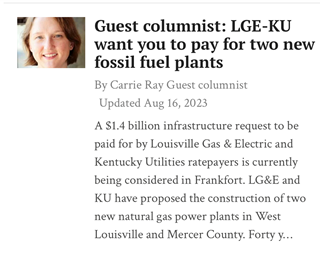This is an op-ed that ran in August 2023.
A $1.4 billion infrastructure request to be paid for by Louisville Gas & Electric and Kentucky Utilities ratepayers is currently being considered in Frankfort. LGE and KU have proposed the construction of two new natural gas power plants in West Louisville and Mercer County. Forty years from now, which is the lifespan of the proposed plants, our nation’s renewable generation is expected to have more than doubled. Yet LGE-KU customers will be locked into paying off the gas-fired power plants when cheaper and cleaner sources of energy are widely available, and possibly be saddled with the costs of decommissioning the plants and for replacement power, if they have to close prematurely. Either way, we lose.

The proposal surprised our group of organizations who keep a careful eye on the state’s utilities to advocate on behalf of everyday Kentuckians that have to pay utility bills. The state requires utilities to submit a 15-year projected resource plan to the Kentucky Public Service Commission every three years. In their 2021 plan, LGE-KU made no mention of planning to build two completely new plants that rely on natural gas – a choice that, pricewise, is one of the most volatile fuel options available today. LGE-KU even noted in their 2021 plan that new gas plants could not be justified without carbon capture and storage due to their CO2 emissions. The pending proposal also disregards the Public Service Commission’s 2021 conclusion that the resource plan did not adequately consider several cost-saving measures, including the use of energy efficiency programs, rooftop solar, and out-of-state wind power. In this proposal, LGE-KU also did not thoroughly analyze the possibility of joining a regional transmission organization, accessing regional capacity in order to avoid having to make major investments to be paid by ratepayers. The lack of consideration for all reasonable alternatives before making huge capital commitments during an uncertain time shows that the utility has not carefully thought through this proposal for major infrastructure paid for by hard-working Kentuckians.
Under the proposal, LGE-KU plans to retire some of its coal assets and to add a modest amount of solar capacity, but their analysis does not fairly compare renewable energy in all its forms to fossil fuel sources – from larger-scale solar installations to community-scale solar and customer-sited rooftop solar. Report after report show that renewables are cheaper than coal, and likely cheaper than natural gas, especially in the long run. Despite what you hear in the news, renewables can increase reliability and provide backup power during extreme weather, and distributed renewables and associated storage allow for microgrid developments and “virtual” power plants. With storage, they can also reduce peak load, which in turn reduces threats from events such as blackouts with winter storm Elliot in December 2022. Many states are already leading the way for how to transition to clean energy while ensuring reliability and affordability.
LGE-KU’s analyses don’t recognize the very real societal costs of continued reliance on fossil fuels for electric generation, and ignore the data proving how much better renewables are for safe, healthy job prospects for energy workers, for the health of residents who live near installations, and for our water sources, farm land, and overall climate. With one of the most carbon intensive energy supplies in the country, Kentucky’s state ranking for impact on the environment is the worst in the US. As a state, we’ve felt the economic, social, and environmental impact of our past power choices in recent years with extreme weather events. The top 3 years for extreme weather events since 1880, as measured by damage costs, occurred in 2020, 2021, and 2022. Our utility companies incurred costs due to these storms and are passing along recovery costs to customers, so that Kentucky ratepayers are now potentially paying for these extreme weather impacts through increased utility rates, insurance rates, taxes, and their own property damage.
Lastly, as the Public Service Commission has noted, LGE-KU should be able to achieve a load reduction of at least 2-3 percent from energy efficiency programs, but their existing “WeCare” program is insufficient and ineffective due to design flaws. Kentuckians desperately need efficiency upgrades. Despite having an enormous opportunity for lowering our electric usage through energy efficiency, Kentucky ranks 44th in residential energy efficiency program savings. We are also one of the top ten states with the most utility shutoffs, with LGE-KU being included in the top 12 worst offenders list in the country. Additionally, energy efficiency reduces demand during extreme conditions and can meaningfully reduce the risk of outages. Investments in efficiency would reduce the need for power, improve grid resiliency, and save Kentuckians money on their bills.
We are at a turning point in history for an energy transition: Kentuckians are being worn down by ever-higher rates and extreme weather; renewable energy is more affordable and reliable than ever before; and there is active government action being taken to discourage risky fossil fuel investment and support clean energy infrastructure. By delaying the inevitable transition away from fossil fuels, and saddling ratepayers with a decades-long commitment to gas-fired electricity, rather than transforming their generation portfolio to cleaner power and an empowered customer base, we only increase the costs to everyday Kentuckians. Renewable energy, storage, and energy efficiency can affordably, safely, and reliably provide electricity for Kentucky while creating jobs and controlling utility costs. Let’s encourage our utilities to embrace the future of clean energy and allow Kentucky to continue our state’s legacy as an energy leader.
To find information on how you can be heard in this case, including upcoming public hearings, please visit Kentuckians for Energy Democracy at k4ed.org.
Carrie Ray is the Energy Program Director at Mountain Association. She can be reached at carrie@mtassociation.org.





